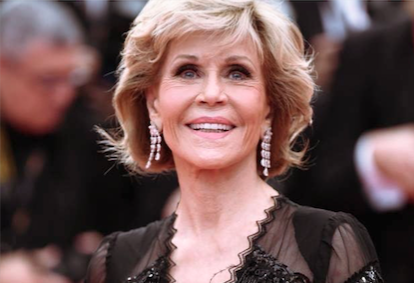Despite being most well known for her actorial debuts in renowned movies like “9 to 5” and T.V. shows like “Grace and Frankie,” Jane Fonda is a lot of things. Activist, writer and fitness guru are just a few. Now 80-years-old, Fonda has gone through a great deal in her life, but she isn’t shy about sharing her experience.
On Thursday, Sept. 27, Fonda was the honored speaker at the Regina A. Quick Center’s Open VISIONS Forum. In her talk “Speaking Out: Artist as Social Activist” Fonda discussed a myriad of topics such as self-reflection, feminism, growing old, her life and activism.
The writer-actress-activist began her talk by recounting a specific event — the eve of her 59th birthday. It was then she realized she would be turning 60 in a year and one day. This soon to be big birthday had Fonda wanting to reflect about her life and prompted her to spend almost two years researching herself.
It’s through this self-reflection that Fonda realized she wasn’t happy. She mentioned how she spent most of her life trying to please people and wanted to do more. After discussing what she wanted with her now-ex-husband, someone who she got along fairly well with, Fonda moved into her daughter’s small apartment, with just her dog and no closet — but she was happy.
Fonda thinks about her life in three, 30-year-long “acts,” which helps her move past her growing fear of getting old and worrying about what will happen. During her talk, the actress mentioned how this motivates her to be involved in things like activism and politics.
One of the biggest themes throughout Fonda’s speech was feminism and a grounding point in her talk was that girls are authentic until they’re 13 and forced into a patriarchal society. Fonda learned through many experiences in her life that young girls, and even women, are forced to be something they are not to please men.
Similarly, Fonda claimed that men also lose something as they grow, but it is their empathy and ability to show emotion rather than their authenticity. This, Fonda says, occurs when boys enter patriarchal society at the age of four or five and become so wrapped up in their masculinity that they won’t admit they’re sad, angry or show any sort of vulnerability. This then results in women having stronger emotional bonds so life is more about “we” than “I” for women while, for men, it’s more so about “I.”
At this point in her speech, Fonda mentioned, in one of the most controversial statements of the night, that we need to be empathic to all people – including President Donald Trump. Fonda defended this by stating how she felt empathy toward Trump as she saw that he never learned to be vulnerable and was pressed to always show off his masculinity. Fonda later stated how she hates what Trump does, but could never hate him as there is already too much hate in this world.
The event continued after Fonda’s talk with a Q&A panel with Dr. Philip Eliasoph – professor of visual and performing arts, Peter Van Heerden – executive director at the Quick Center and Sissy Cargill Biggers – media consultant and lifestyle television spokesperson. Although a bit all over the place, Fonda gave a lot of interesting insight, especially about what she felt about certain celebrities and figureheads she’s met over the years. For example, Fonda remarked that Robert De Niro has “issues” and Mia Farrow’s son, best known for breaking the Harvey Weinstein story and the mystery surrounding who his father is, looks a lot like Frank Sinatra.
The Q&A was then opened to the audience – allowing members to ask Fonda a question they might have for her. There were quite a few unique questions asked. One audience member kept stating facts to Fonda about a woman’s rights cause that had the panel begging them to ask their question, which was just seeing if Fonda would sponsor their cause. Another member went on a fairly long rant about how Fonda has an amazing voice and if she ever thought about singing.
Jane Fonda was a witty and quick thinking speaker. Her speech was a source of motivation for women and men alike who struggle with societal restrictions. Overall, her speech created a drive for her audience to do as much as one possibly can within their life while also being happy.


Leave a Reply